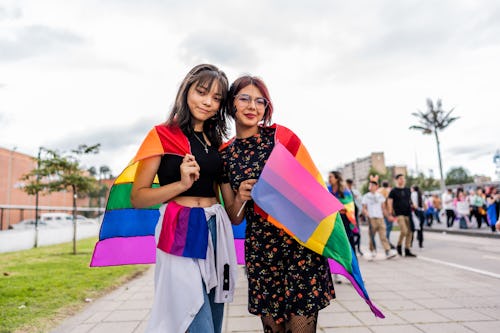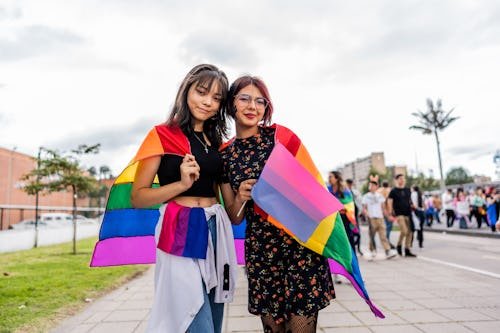
A new report released by the Trevor Project took a closer look at mental health among LGBTQ+ youth across the U.S. and what parents and allies can do to best support them.
The report comes as a rise in discriminatory policies and hateful political rhetoric has pushed many LGBTQ+ young people to consider moving states. The impacts of the political environment are clear in the report: 90% of LGBTQ+ young people said that recent politics negatively affected their mental health.
The picture painted of LGBTQ+ mental health is bleak. The Trevor Project found that 39% of LGBTQ+ young people seriously considered attempting suicide in the past year, rising to 46% among transgender and nonbinary young people. More than one in ten LGBTQ+ youth reported attempting suicide.
The report also found that 50% of LGBTQ+ young people who wanted mental health care were unable to get it. The most commonly-cited reason: young people were afraid to discuss their mental health concerns with others. Affordability and not wanting to get their parents’ permission were also among the most prevalent barriers to care.
Trends varied regionally, with LGBTQ+ youth living across the South reporting the highest rates of lacking access to mental health care, along with the highest rates of discrimination based on sexual orientation or gender identity. Meanwhile, while the West reported some of the highest rates of accepting home environments, it also reported some of the highest levels of depression.
The Midwest reported some of the highest rates of suicidal thoughts and suicide attempts, as well as some of the highest rates of physical threat or harm. The Northeast trended more pro-LGBTQ+ than any region, reporting the highest rates of community acceptance and low risk of suicidal thoughts or attempts.
"Many of these state findings are grim, and they signal serious gaps in resources and outsized mental health challenges for already marginalized youth that we simply must address," said Dr. Ronita Nash, Vice President of Research at the Trevor Project. "However, these data also give us a clear call to action: we must all do our part to make LGBTQ+ young people feel more welcome and accepted in the places they call home."
The report revealed just how impactful it can be to take even small steps to show LGBTQ+ youth that they are loved and accepted. LGBTQ+ young people who lived in very accepting communities attempted suicide at less than half the rate of their peers in very unaccepting communities. And, more than half (54%) of transgender and nonbinary young people found their school to be gender-affirming — and those who did reported lower rates of attempting suicide.
"Similar to previous research, these data reinforce that LGBTQ+ youth are not disproportionately impacted by suicide because of who they are, but rather, because of how they are mistreated, stigmatized and discriminated against," said Jaymes Black, CEO of The Trevor Project.
The Trevor Project asked LGBTQ+ young people directly how those in their lives could best show love and acceptance. Topping the list is trusting that they know who they are, standing up for them and not supporting politicians that advocate for anti-LGBTQ+ legislation.
“You don’t need to be an expert in LGBTQ plus topics or identities to show young people that you care, no matter where you live, how you’re raised or your comfort level with LGBTQ plus topics,” Dr. Nash told Scary Mommy.
“It’s never too late to show LGBTQ plus youth that that they are loved and supported.”
Head to the full report to see what LGBTQ+ young people from your state suggest you do to show your support.
Disclaimer: This story has not been edited by us and is published as shown on Scary Mommy.


Leave a Reply